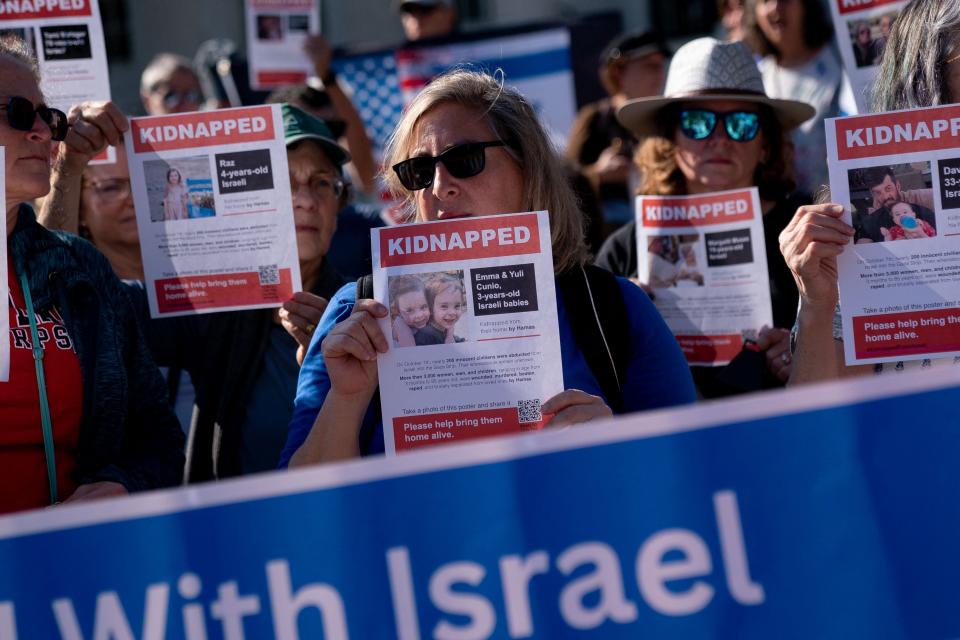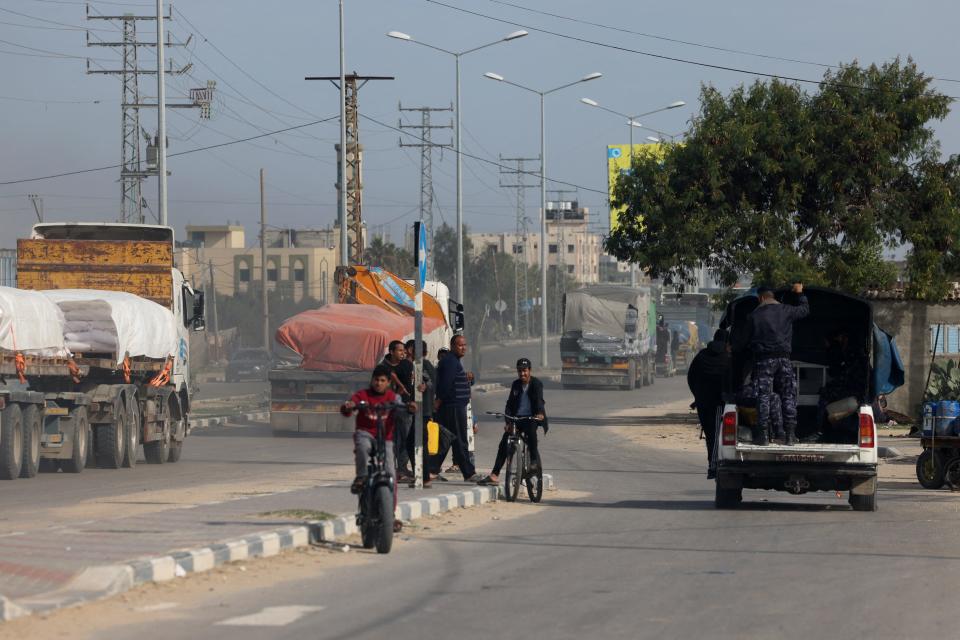Hamas captivity like 'Russian roulette,' recently released hostage says: Live updates
Editor's Note: For the latest news on the Israel-Hamas conflict, please see our live updates file here.
Family separation, uncertainty about their fate, a scarcity of food and limited access to bathroom facilities are among the many hardships Israeli hostages held by Hamas endure, says a former captive freed two weeks ago.
Sharon Alony-Cunio and her twin girls, age 3, made it out after 52 days, but her husband, David Cunio, is still being held in Gaza, along with about 135 other Israelis. They were kidnapped during Hamas’ Oct. 7 rampage that left more than 1,200 people dead in Israel border communities.
In her first media interview since being freed during a weeklong truce late last month, Alony-Cunio told Reuters captivity was “a Russian roulette. You don't know whether tomorrow morning they'll keep you alive or kill you, just because they want to or just because their backs are against the wall.’’
Alony-Cunio, 34, told the news agency one of the girls was taken separately to Gaza and did not rejoin the family for 10 days. The three days before their Nov. 27 release, David was taken away.
“I am petrified I will get bad news that he is no longer alive,’’ she said. “I am torn without my second half, the love of my life, the father of my daughters who ask me every day, ‘Where is daddy?’’’
Alony-Cunio said fellow hostages would sacrifice some of their meager rations of pita bread and sometimes dates, cheese or meat rice for her girls − Emma and Julie − who struggled waiting for a toilet and had to use a sink or trash can.

Their group of hostages was kept above ground instead of in the miles of Hamas tunnels under Gaza, but the interminable days and not knowing whether the Israeli government had given up on them made the anguish of captivity nearly intolerable. Alony-Cunio is advocating for the remaining hostages to be released as soon as possible.
“We are not just names on a poster,’’ she said. “We are human beings, flesh and blood. The father of my girls is there, my partner, and many other fathers, children, mothers, brothers.’’
Netanyahu says dozens of Hamas militants surrendering; Blinken defends veto on UN cease-fire resolution: Updates

Developments:
∎ The 90-year-old father of Al Jazeera journalist Anas al-Sharif has been killed in an Israeli strike on his house in Jabaliya, northern Gaza Strip, the media outlet said. The rest of the family had evacuated to a U.N. shelter but the father could not leave due to his age and health, Al Jazeera reported.
∎ The resignations of University of Pennsylvania president Liz Magill and Scott Bok, chairman of Penn's board of trustees, have done little to quell the desire for further change at the school, students say. Magill and Bok were accused of failing to adequately denounce antisemitic intimidation and hate speech at Penn. Read more here.
∎ The Israel Defense Forces said it has killed Emad Krikae, describing him as the commander of Hamas’ Shejaiya Battalion. The unit's former commander had also been "eliminated,'' the IDF said.
∎ Russian Deputy Foreign Minister Mikhail Bogdanov, during talks with Palestinian and Hamas officials, pressed for an end to the fighting and the release of hostages held by militants, Russia's Tass media outlet reported Monday. Israeli Prime Minister Benjamin Netanyahu on Sunday accused Russia of taking "anti-Israel" positions.
As University of Penn leaders resign, students say 'a lot still needs to change'
War to continue for weeks and months, Israeli official says
Israel's overwhelming ground and air attack in Gaza figures to continue for weeks, and a subsequent military campaign of less intensity could go on for months, Defense Minister Yoav Gallant indicated Monday in an interview with The Associated Press.
Undaunted by international pressure for a cease-fire amid widespread devastation and a mounting civilian death toll in Gaza, Gallant would not commit to a deadline for completing the current phase of Israel's military operation as its seeks to eliminate Hamas' leadership and its ability to threaten Israel.
“We are going to defend ourselves,'' he said. "I am fighting for Israel’s future.”
Gallant said the next phase would focus on fighting against “pockets of resistance” and would require Israeli troops to maintain their freedom of operation. “That’s a sign the next phase has begun,” he said.
The Israeli military is still confronting dogged resistance from militants in parts of the battered Gaza City and the urban Jabaliya refugee camp, while also making headway in the southern city of Khan Younis, which has swollen with tens of thousands of refugees trying to flee the fighting.
Starvation, disease increasingly common in Gaza
Hunger and disease are becoming even bigger factors in the growing humanitarian crisis in Gaza, where 1.9 million of the 2.3 million prewar residents have been displaced, mostly going to the strip’s south.
The difficulty of distributing aid amid the fighting – including such necessities as food, water and medicine – is making already dire conditions downright untenable. The U.N. World Food Programme said over the weekend that half the people in Gaza are starving, and only one out of every 10 is eating every day.
The U.N. agency for Palestinian refugees, known as UNRWA, reported Gazans carrying their dead children to health facilities.
“There's not enough food. People are starving,’’ tweeted Carl Skau, COO of the World Food Programme.
Shelters are overcrowded beyond capacity in the south, where about 1 million Palestinians have sought refuge in 94 U.N. facilities, leading to the spread of infectious diseases.
Nicholas Papachrysostomou, emergency coordinator in Gaza for the aid group Doctors Without Borders, said “every other patient” at a clinic in Rafah has a respiratory infection. In shelters where hundreds share a single toilet, diarrhea is widespread, particularly among children, he said.
Israel to open second crossing as aid distribution goes slowly
The Israeli agency responsible for civilian affairs in Gaza said Monday it had increased its ability to inspect aid shipments bound for Gaza and blamed the U.N. for the long line of trucks awaiting passage into the war-battered Palestinian enclave.
The U.N. says the fighting makes it too dangerous for its staffers to go to work.
The Israeli Defense Ministry’s agency, Coordination of Government Activities in the Territories − or COGAT − said it was ready to open a second border crossing to allow aid to flow into Gaza. Israel has only been inspecting the trucks at the smaller Nitzana crossing before entering Gaza through Rafah on the Egyptian border.
“Kerem Shalom (crossing) is to be opened, so the amount of inspections will double,” COGAT said in a statement. “But the aid keeps waiting at the entrance of Rafah. The U.N. must do better. The aid is there, and the people need it.”
Israel says it has already been clearing more than 200 trucks of aid for passage into Gaza each day, but the U.N. has not been able to process and distribute the aid as fast as it comes in.
U.N. Secretary-General Antonio Guterres has repeatedly emphasized the lack of safety for U.N. staff and the intensity of military operations, leading to at least 130 U.N. staff members being killed so far.
“Some of our staff take their children to work so they know they will live or die together,” he said.
Gaza the most dangerous place in world for women, advocacy group says
Israel's military campaign in Gaza has turned the enclave into the most dangerous place in the world for women, the advocacy group ActionAid International says.
"Women and girls in Gaza are suffering from unprecedented levels of violence during the Israeli military escalation," says a new report by the organization, whose mission is centered on "feminist leadership.''
Health officials in Gaza have estimated the total Palestinian death toll at about 18,000 and say about 70% are women and children. ActionAid says women and girls are being killed and injured at "horrific" rates, denied their basic rights to food, water and health care on a daily basis, and exposed to enormous psychological stress and trauma after two months of "living in terror."
"It is the most dangerous place for women now, at this current time, according to numbers describing the reality and conditions of women in Gaza," ActionAid spokesperson Riham Jafari told USA TODAY in an email.
Israel says it found munitions stash in Gaza mosque
Israeli military says it discovered an RPG training facility hidden inside a mosque in a civilian neighborhood of northern Gaza. Weapons seized included grenades, cartridges and various firearms, the military said in a statement. Some of the weapons, displayed on the military's social media, were found in bags belonging to civilian organizations, the statement said.
The military has defended its deadly and destructive ground invasion of Gaza, claiming Hamas consistently uses civilians as human shields and establishes military facilities in civilian buildings. Hamas has denied the claims.
Israel accused of attempting to drive Palestinians out of Gaza
Jordan’s Prime Minister Bisher Khasawneh accused Israel of attempting to drive Palestinian civilians out of Gaza, calling the effort a "potential game changer.” Khasawneh said conditions "suggest that there is a deliberate attempt to generate the conditions for Gazans – coupled with increased violence in the West Bank abandoned to settlers – that will compel people to consider the option of moving across the border."
Philippe Lazzarini, the commissioner-general of the U.N. agency for Palestinian refugees, made a similar claim in an op-ed piece for the Los Angeles Times.
"The developments we are witnessing point to attempts to move Palestinians into Egypt, regardless of whether they stay there or are resettled elsewhere,” he wrote.
UN General Assembly to address cease-fire resolution
The U.N. General Assembly on Tuesday will vote on a resolution calling for a cease-fire in Gaza. The resolution is similar to the one the U.S. vetoed in the Security Council last week. But the differences are no member country has veto power in the General Assembly, and its approved resolutions are not binding. Egypt sought the resolution, expected to easily win approval, on behalf of the Arab Group, which includes 22 member nations, and Organization for Islamic Cooperation Group, which represents more than 50 countries.
Israel is "endangering more civilian lives, risking further deterioration of this already-catastrophicsituation, and threatening regional and international peace and security, making it urgent that theGeneral Assembly convene to address this crisis," Egypt and the Republic of Mauritania said in a joint letter to Assembly President Dennis Francis of Trinidad and Tobago.
This article originally appeared on USA TODAY: Israel war updates: Captivity like 'Russian roulette' ex-hostage says


